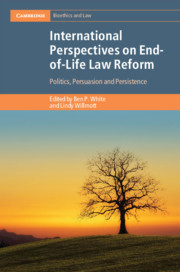Book contents
- International Perspectives on End-of-Life Law Reform
- Cambridge Bioethics and Law
- International Perspectives on End-of-Life Law Reform
- Copyright page
- Contents
- Preface
- About the Editors
- List of Contributors
- Table of Cases
- Table of Statutes, Bills and Regulations
- 1 End-of-Life Law Reform
- 2 The Path from Rodriguez to Bill C-14 and Beyond
- 3 The Extension of the Belgian Euthanasia Law to Minors in 2014
- 4 The Role of Scientific Evaluations of the Dutch Termination of Life on Request and Assisted Suicide (Review Procedure) Act
- 5 The Challenging Path to Voluntary Assisted Dying Law Reform in Australia
- 6 Should Assisted Dying Require the Consent of a High Court Judge?
- 7 Aid in Dying in the United States
- 8 The Medical Regulator as Law Reformer
- 9 Extrajudicial Resolution of Medical Futility Disputes
- 10 Challenging Mandatory Court Hearings for People in Vegetative and Minimally Conscious States
- 11 Withholding and Withdrawing Life-Prolonging Treatment and the Relevance of Patients’ Wishes
- 12 International Perspectives on Reforming End-of-Life Law
- Index
6 - Should Assisted Dying Require the Consent of a High Court Judge?
Published online by Cambridge University Press: 02 December 2021
- International Perspectives on End-of-Life Law Reform
- Cambridge Bioethics and Law
- International Perspectives on End-of-Life Law Reform
- Copyright page
- Contents
- Preface
- About the Editors
- List of Contributors
- Table of Cases
- Table of Statutes, Bills and Regulations
- 1 End-of-Life Law Reform
- 2 The Path from Rodriguez to Bill C-14 and Beyond
- 3 The Extension of the Belgian Euthanasia Law to Minors in 2014
- 4 The Role of Scientific Evaluations of the Dutch Termination of Life on Request and Assisted Suicide (Review Procedure) Act
- 5 The Challenging Path to Voluntary Assisted Dying Law Reform in Australia
- 6 Should Assisted Dying Require the Consent of a High Court Judge?
- 7 Aid in Dying in the United States
- 8 The Medical Regulator as Law Reformer
- 9 Extrajudicial Resolution of Medical Futility Disputes
- 10 Challenging Mandatory Court Hearings for People in Vegetative and Minimally Conscious States
- 11 Withholding and Withdrawing Life-Prolonging Treatment and the Relevance of Patients’ Wishes
- 12 International Perspectives on Reforming End-of-Life Law
- Index
Summary
A consensus has recently developed within the UK Parliamentary debate over the legalisation of assisted dying that the consent of a High Court judge should be required as part of a future regulatory regime. This chapter questions the basis of this consensus, arguing that it is neither evidence-based nor required by the decision of the UK Supreme Court in Nicklinson. The chapter begins by briefly sketching the approach of permissive regulatory regimes to the evaluation of assisted dying cases which demonstrates the dearth of direct experience of judicial approval of such cases. Recent calls for prospective judicial approval in two jurisdictions then contemplating legalisation are considered ‒ Canada (which did legalise) and England and Wales (which did not), demonstrating that these calls are tactical and lack substantive argument. The chapter then examines data from permissive regimes to describe persons likely to seek assistance in dying and evaluates the extent to which a prospective judicial approval requirement would meet likely legislative goals, before recommending an alternative approach and drawing broader lessons from this experience for legislative change on assisted dying.
Keywords
- Type
- Chapter
- Information
- International Perspectives on End-of-Life Law ReformPolitics, Persuasion and Persistence, pp. 113 - 144Publisher: Cambridge University PressPrint publication year: 2021
- 3
- Cited by

